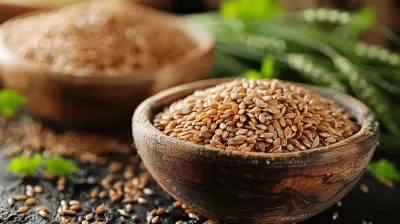How to Support Your Immune System During Postpartum Recovery
17 May 2025
Bringing your little one into the world is nothing short of a miracle. But let’s be real—giving birth is also like running the most intense marathon your body can go through. Once the baby is here, your body is on a mission to repair itself, produce milk, regulate hormones, and—on top of everything—keep you from catching every little bug flying around.
Now that you're in the postpartum stage, your immune system could use a little TLC, right? You’ve got enough on your plate with diaper changes, midnight feedings, and figuring out that whole sleep-while-the-baby-sleeps thing. So, how do you make sure your immune system bounces back just as strong as the rest of you?
Let’s dive into everything you need to know about how to support your immune system during postpartum recovery. No fluff—just real talk, helpful tips, and a little bit of motivation along the way.
Why Is Your Immune System Weakened After Birth?
Okay, first things first. You might be wondering, “Why is my immune system even struggling right now?” Great question.During pregnancy, your immune system intentionally tones itself down to avoid attacking your baby. Think of it like a well-trained guard dog that’s temporarily told, “Hey, chill out.” After birth, your body has to recalibrate and get those immune responses back up and running.
Add in sleep deprivation, hormonal roller coasters, stress, potential blood loss, and physical trauma (whether from vaginal birth or C-section), and it's no wonder your immune system is running on fumes.
1. Prioritize Rest (Yes, Seriously)
Let’s just call this out: telling a new mom to “get sleep” can feel like a cruel joke. But hear me out—it matters. Rest isn’t just about catching Zs; it’s when your body shifts into repair mode.Even short naps can help. Try to sneak in rest whenever your baby sleeps. Ask for help from your partner, family, or friends so you can lie down. Your immune system functions best when it’s not running on empty. Kind of like your phone—it won't operate well at 2% battery, right?
Pro-Tip:
Cut back on unnecessary chores (dust bunnies will survive), and if someone offers help, say yes!
2. Eat Nutrient-Dense, Immune-Boosting Foods
Now’s the time to think of food as medicine. Yes, those postpartum snacks might be calling your name (hello, muffins), but your body craves nutrients to heal and protect.Try to load your plate with:
- Leafy greens – kale, spinach, and Swiss chard are packed with vitamin C, folate, and antioxidants.
- Berries – full of immune-loving vitamin C.
- Sweet potatoes – high in beta-carotene, great for tissue repair.
- Bone broth – soothing and full of collagen and minerals.
- Fatty fish – salmon is rich in omega-3s that reduce inflammation.
- Fermented foods – think yogurt, kimchi, and kefir for gut health (hello, probiotics!).
The idea is simple: the more whole, colorful foods you eat, the better equipped your immune system is to rebuild and defend.
3. Stay Hydrated (Your Body Will Thank You)
Water is your best friend right now. Not only does it help with milk production if you’re breastfeeding, but it also flushes out toxins and supports every cell in your immune system.Aim for at least 8-10 cups a day, but if you’re nursing, bump that up. Keep a water bottle nearby—especially during feeds when thirst tends to spike.
Tip:
If plain water feels boring, add lemon slices, cucumber, or fresh mint for some spa-water vibes.4. Don’t Shy Away from Supplements
While real food should be your go-to, it’s perfectly okay—and sometimes necessary—to lean on supplements for a bit.Here are some commonly recommended supplements during postpartum:
- Vitamin D: Essential for immune regulation; most of us don’t get enough from sunlight alone.
- Omega-3s (DHA/EPA): Needed for brain health and fighting inflammation.
- Vitamin C and Zinc: Power duo for immunity.
- Probiotics: Helps balance gut flora, which plays a major role in immune health.
- Iron: Especially important if you lost a lot of blood during delivery.
Before starting anything new, always chat with your healthcare provider. The goal is to support, not overload.
5. Manage Stress (Easier Said Than Done, But Still Important!)
Postpartum life is beautiful chaos. But stress? That’s one thing your immune system doesn’t need.High stress = increased cortisol = weakened immune function.
So, how do you keep stress in check when you’re sleep-deprived and in new-mom survival mode?
- Practice deep breathing – even five slow breaths can reset your nervous system.
- Say 'no' to extra obligations – you don’t have to host brunch or entertain visitors.
- Get fresh air – sunlight + nature = instant mood booster.
- Limit news and social media overload – your brain needs calm, not chaos.
- Talk it out – whether it’s a friend, therapist, or support group, venting helps.
6. Support Your Gut Health
Here’s something a lot of people don’t realize—around 70% of your immune system lives in your gut!So while your belly might feel like it’s gone a few rounds in a boxing match, taking care of your digestive tract is key.
- Add probiotic-rich foods and prebiotic fibers like garlic, onions, bananas, and oats.
- Avoid too much sugar or highly processed foods—they mess with your gut flora big time.
- Stay regular with gentle movement and fiber-rich foods.
A healthy gut = a happy immune system.
7. Gentle Movement Over Intense Workouts
You might be itching to get your pre-baby body back, but slow your roll. The early postpartum period is not the time for high-intensity workouts.Instead, opt for gentle movement:
- Walking – start slow and short, then build up.
- Postnatal yoga – great for relaxing your mind and stretching sore muscles.
- Deep core and pelvic floor exercises – these help with internal healing and stability.
Movement stimulates lymph flow, reduces inflammation, and boosts circulation—all major players for immune health.
8. Pay Attention to Your Mental Health
Your mental well-being and immune health are more connected than you might think. Anxiety, depression, and overwhelm can all take a toll on your body’s ability to fight infection.So, if you're feeling off, sad, or beyond exhausted consistently, please don’t brush it aside. PPD (postpartum depression) and PPA (postpartum anxiety) are more common than you think—and they’re nothing to be ashamed of.
Reach out. Whether it’s a therapist, counselor, doctor, or friend, talking helps. You don’t have to face it alone.
9. Stay on Top of Hygiene and Illness Prevention
Let’s not forget the basics. With a newborn around, germs are everywhere. But now, you’re more vulnerable too.- Wash your hands frequently.
- Limit visitors, especially during cold and flu season.
- Wipe down high-touch surfaces.
- Don’t be afraid to enforce “if you’re sick, stay away” rules.
Your body is working overtime. A basic cold that used to be a nuisance can feel like a freight train now.
10. Listen to Your Body
This one might be the most important of all. Tune into what your body is telling you. Are you feeling extra tired? Run-down? Not healing like you expected?Don’t ignore it. Speak up. Check in with your doctor or midwife. Trust your gut (literally and figuratively). You're not being dramatic—you’re being smart.
Final Thoughts: You’ve Got This, Mama 💪
Postpartum recovery is a journey, not a sprint. Your immune system is just one part of the healing picture, but giving it the support it needs can make a world of difference.Be kind to yourself. Nourish your body. Rest whenever you can. Accept help. And remember—your health matters just as much as your baby's.
You’ve done something incredible. Now it’s time to care for you.
all images in this post were generated using AI tools
Category:
Postpartum HealthAuthor:

Holly Ellison
Discussion
rate this article
3 comments
Rusty McGinn
Nutrition fuels immunity; prioritize it!
June 5, 2025 at 4:29 PM

Holly Ellison
Absolutely! Prioritizing nutrition is key to strengthening your immune system during postpartum recovery.
Parisa Jenkins
Postpartum isn't just about baby bliss; it's a war zone for your body! Ditch the sugar, embrace the greens, and remember: a strong mama means a strong immune system. Let’s not just survive; let’s thrive!
May 23, 2025 at 4:56 PM

Holly Ellison
Absolutely! Prioritizing nutrition and wellness during postpartum is essential for both recovery and immunity. Let's thrive together!
Soryn Lane
What a fantastic guide! Supporting our immune system during postpartum recovery is so crucial. These tips are not only helpful but uplifting. Cheers to embracing health and wellness during this special time! 🌟
May 23, 2025 at 3:01 AM

Holly Ellison
Thank you so much for your kind words! I'm glad you found the tips helpful for this important journey. Cheers to health and wellness! 🌟



